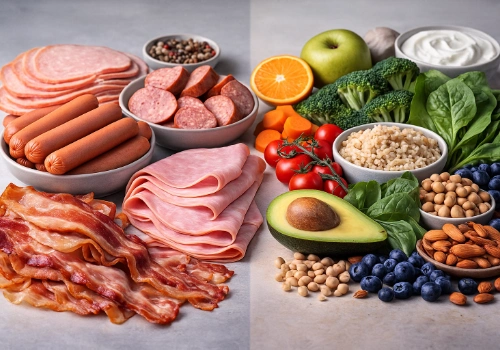
Why Processed Meats Are Getting Renewed Attention
Processed meats have long been a topic of discussion in nutrition and gastroenterology. In 2025, new large-scale research published in Nature Medicine added to existing evidence suggesting that regular consumption of processed meats is associated with increased risks of several chronic diseases.
For patients trying to make informed dietary choices—whether for digestive health, heart health, or long-term disease prevention—understanding what this research does (and does not) say is important.
What Counts as Processed Meat?
Processed meat refers to meat that has been cured, smoked, salted, fermented, flavored, or preserved to improve shelf life or taste.
Common examples include:
- Hot dogs
- Bacon
- Deli meats (ham, turkey, roast beef)
- Sausage, salami, pepperoni
- Corned beef
- Beef jerky
- Canned meats
- Pre-seasoned or packaged meat products
If a meat contains preservatives such as nitrates or nitrites, or has been significantly altered from its natural state, it is generally considered processed.
What the 2025 Research Found
The 2025 analysis reviewed dozens of high-quality observational studies examining dietary patterns and health outcomes over time.
Key findings included associations between higher processed meat intake and:
- Increased risk of colorectal cancer
- Higher rates of Type 2 diabetes
- Increased risk of ischemic heart disease
Even relatively small daily servings were associated with measurable increases in risk. Importantly, the study did not claim immediate harm or certainty, but rather identified patterns observed across large populations.
Why Processed Meats May Increase Health Risks
Researchers believe several factors may contribute to these associations:
1. Chemical Compounds Formed During Processing
- N-nitroso compounds (linked to nitrates and nitrites)
- Compounds formed during smoking or high-temperature cooking
- Heme iron, which may promote oxidative stress
These substances may contribute to inflammation and cellular damage over time.
2. High Sodium Content
Excess sodium intake is associated with:
- High blood pressure
- Increased cardiovascular strain
- Greater stroke risk
3. Saturated Fat and Metabolic Effects
Regular intake of processed meats may influence:
- Cholesterol levels
- Insulin sensitivity
- Chronic low-grade inflammation
Is There a “Safe” Amount of Processed Meat?
Most major health organizations, including the World Health Organization and the American Institute for Cancer Research, recommend limiting processed meat intake as much as possible.
This does not mean occasional consumption causes immediate harm. Rather, risk appears to increase with frequency and long-term intake, making processed meats best treated as occasional foods rather than daily staples.
Healthier Alternatives to Processed Meats
You do not need to eliminate meat entirely to reduce risk.
Lower-risk protein options include:
- Fresh or frozen poultry and fish
- Eggs
- Beans, lentils, and legumes
- Tofu or tempeh
- Fresh, unprocessed beef or pork
Simple swaps:
- Grilled chicken instead of deli meat
- Beans or lentils instead of sausage
- Fresh turkey or chicken breast instead of packaged cold cuts
When to Talk With a Healthcare Provider
If processed meats are a regular part of your diet — or if you have questions about how nutrition may affect your long-term health — a conversation with a healthcare provider can be helpful.
You may want to schedule a visit if you:
- Eat processed meats frequently
- Have a family history of colorectal cancer
- Have diabetes, heart disease, or high blood pressure
- Experience ongoing digestive symptoms
A clinician can review your personal health history, discuss current research in context, and help you make practical, sustainable dietary choices that support your overall health.
To learn more or to schedule an appointment, visit bassmedicalgroup.com or speak with your primary care provider.




